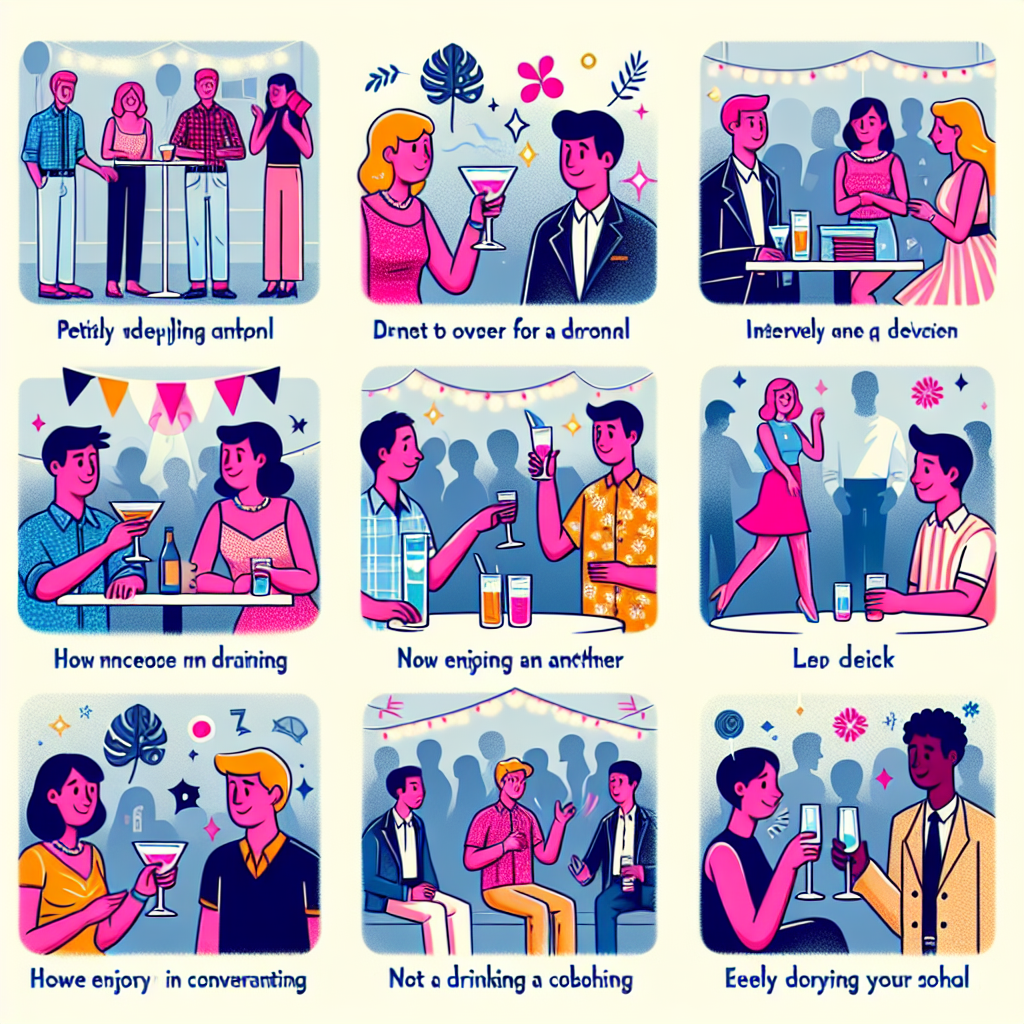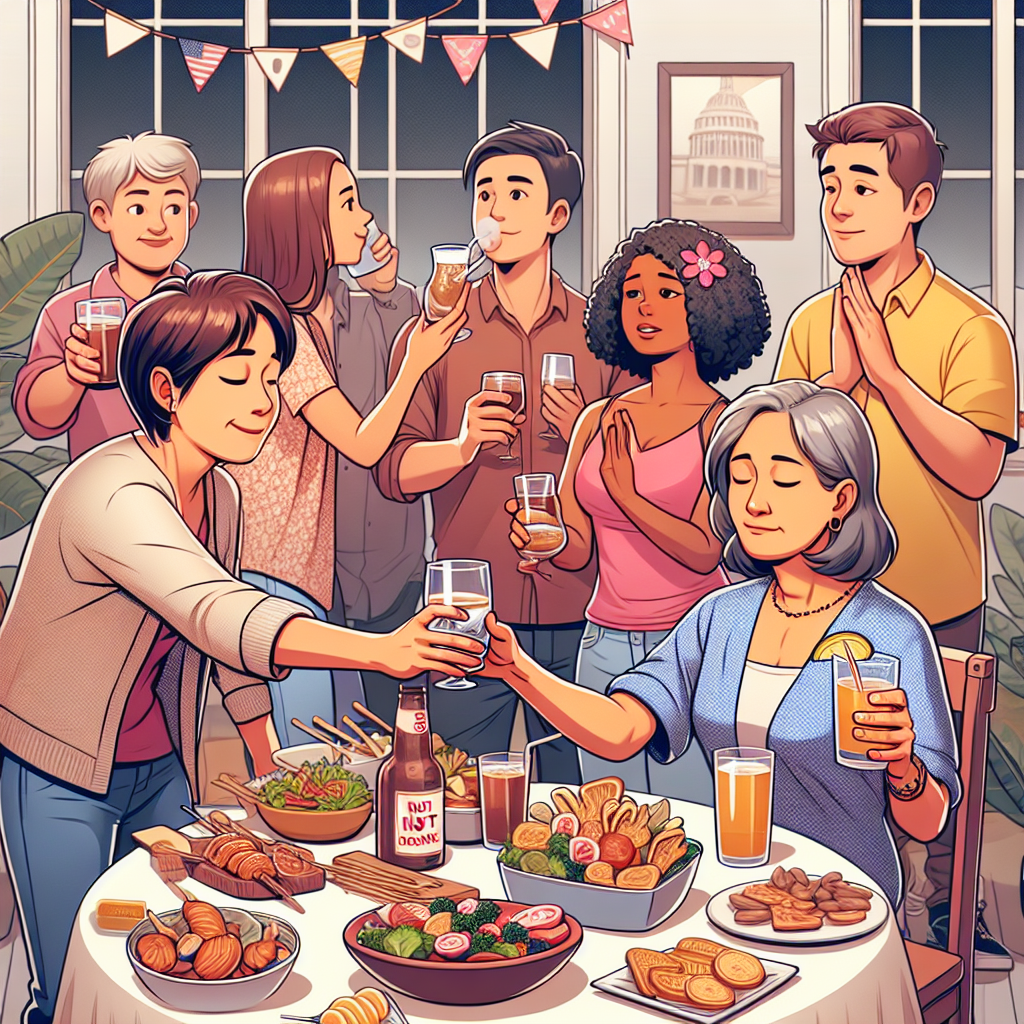-
Table of Contents

“Empower Your Choices: Stay Sober, Stay Strong.”
Introduction
Staying sober during social events can be a challenging yet rewarding endeavor, especially in environments where alcohol and other substances are prevalent. Whether you’re in recovery, abstaining for health reasons, or simply choosing a sober lifestyle, navigating social gatherings without partaking in drinking or drug use requires preparation, determination, and a solid support system. This guide will provide practical strategies and tips to help you maintain your sobriety while still enjoying and participating in social events. From setting clear intentions and finding supportive friends to developing coping mechanisms and having an exit plan, these steps will empower you to stay true to your commitment to sobriety.
Strategies For Staying Sober At Parties And Social Gatherings
Navigating social events while maintaining sobriety can be a challenging endeavor, but with the right strategies, it is entirely possible to enjoy these gatherings without compromising your commitment to staying sober. One of the most effective ways to prepare for a social event is to have a clear plan in place. Before attending, take a moment to remind yourself why you chose sobriety and the benefits it brings to your life. This mental preparation can fortify your resolve and provide a strong foundation for the evening ahead.
Another crucial strategy is to bring a sober friend along. Having someone who understands your journey and supports your decision can make a significant difference. This person can act as a buffer in uncomfortable situations and offer encouragement when needed. Additionally, it can be helpful to inform the host of your sobriety beforehand. This way, they can be more mindful of your needs and possibly provide non-alcoholic beverage options.
When you arrive at the event, it’s important to stay engaged and active. Participate in conversations, games, or activities that keep your mind occupied and away from thoughts of drinking. If you find yourself in a situation where alcohol is being offered, a simple yet firm “No, thank you” is often sufficient. You can also have a non-alcoholic drink in hand, which can help deter others from offering you alcoholic beverages.
Moreover, it’s beneficial to practice self-care throughout the event. If you start feeling overwhelmed or tempted, take a moment to step outside or find a quiet space to regroup. Deep breathing exercises or a quick phone call to a supportive friend can help you regain your composure and focus. Remember, it’s perfectly okay to leave early if you feel that staying longer might jeopardize your sobriety. Your well-being is the top priority.
In addition to these strategies, it’s essential to cultivate a mindset of gratitude and positivity. Reflect on the progress you’ve made and the strength it takes to maintain sobriety. Celebrate your victories, no matter how small they may seem. This positive reinforcement can boost your confidence and reinforce your commitment to a sober lifestyle.
Furthermore, consider seeking out sober-friendly events or gatherings. Many communities offer social activities that do not involve alcohol, providing a safe and supportive environment for those in recovery. Engaging in these events can help you build a network of like-minded individuals who share your commitment to sobriety.
Lastly, don’t hesitate to seek professional support if needed. Therapists, counselors, and support groups can offer valuable guidance and resources to help you navigate social situations while staying sober. They can provide coping strategies and a sense of community that can be incredibly beneficial on your journey.
In conclusion, staying sober during social events is a multifaceted challenge that requires preparation, support, and self-awareness. By planning ahead, bringing a supportive friend, staying engaged, practicing self-care, and maintaining a positive mindset, you can successfully navigate these gatherings without compromising your sobriety. Remember, your commitment to a sober lifestyle is a testament to your strength and resilience. Embrace each social event as an opportunity to reinforce your dedication and celebrate the positive changes in your life.
Tips For Maintaining Sobriety During Celebrations And Events
Navigating social events while maintaining sobriety can be a challenging endeavor, but with the right strategies and mindset, it is entirely possible to enjoy celebrations without compromising your commitment to a sober lifestyle. One of the most effective ways to stay sober during social events is to plan ahead. Before attending any gathering, take a moment to consider the potential triggers you might encounter. By identifying these triggers in advance, you can develop a plan to manage them. For instance, if you know that certain people or situations might tempt you to drink, think about how you can avoid or handle these scenarios.
Another crucial tip is to bring your own non-alcoholic beverages. This not only ensures that you have something to drink but also helps you feel more comfortable and less conspicuous. Many people find that holding a drink, even if it’s just soda or sparkling water, can alleviate the pressure to consume alcohol. Additionally, having a drink in hand can deter others from offering you alcoholic beverages, as they may assume you are already drinking.
It’s also beneficial to have a support system in place. Whether it’s a friend, family member, or sponsor, having someone you can rely on for encouragement and accountability can make a significant difference. Let them know about your commitment to staying sober and ask for their support during the event. Sometimes, just knowing that someone is there for you can provide the strength needed to resist temptation.
Moreover, it’s important to practice self-care before and after the event. Ensure that you are well-rested, nourished, and in a positive state of mind before attending. After the event, take time to reflect on your experience and acknowledge your achievements. Celebrating your success, no matter how small, can reinforce your commitment to sobriety and boost your confidence for future events.
In addition to these strategies, it’s helpful to develop a repertoire of responses for when you’re offered a drink. Having a few polite but firm refusals ready can make it easier to decline without feeling awkward. For example, you might say, “No thanks, I’m driving,” or “I’m taking a break from alcohol.” Most people will respect your decision and move on.
Engaging in activities that don’t revolve around drinking can also be a great way to stay sober. Focus on the social aspects of the event, such as conversations, games, or dancing. By immersing yourself in these activities, you can enjoy the celebration without feeling the need to drink. Furthermore, if you find yourself in a situation where the temptation becomes too strong, don’t hesitate to leave. Your sobriety is more important than staying at an event that jeopardizes your well-being.
Lastly, remember to be kind to yourself. Staying sober is a journey, and it’s okay to face challenges along the way. Each event you attend sober is a testament to your strength and determination. By implementing these tips and maintaining a positive mindset, you can successfully navigate social events and continue to thrive in your sober lifestyle.
Q&A
1. **Question:** What are some strategies to avoid drinking alcohol at social events?
**Answer:** Some strategies include bringing your own non-alcoholic beverages, having a plan for how to decline offers of alcohol, staying close to supportive friends or family, and engaging in activities that don’t involve drinking.
2. **Question:** How can you handle peer pressure to drink at social gatherings?
**Answer:** You can handle peer pressure by confidently saying no, suggesting alternative activities, using a pre-prepared excuse, or leaving the situation if it becomes too uncomfortable.
Conclusion
Staying sober during social events involves several key strategies: planning ahead by setting clear intentions, bringing your own non-alcoholic beverages, practicing refusal skills, seeking support from sober friends or groups, staying engaged in activities that don’t involve drinking, and having an exit plan if the environment becomes too challenging. By implementing these tactics, individuals can maintain their sobriety while still enjoying social interactions.



